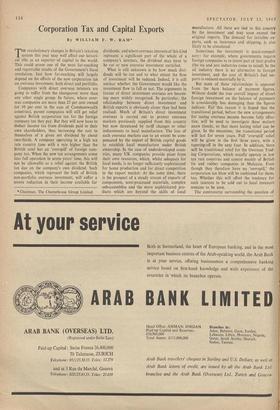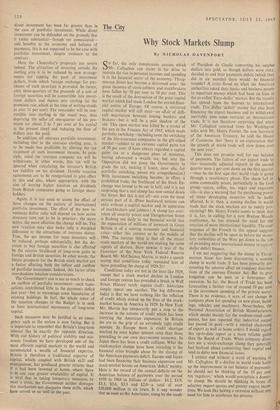Corporation Tax and Capital Exports
By WILLIAM F. W. RAM*
TEM revolutionary changes in Britain's taxation system this year may well affect our histori- cal role as an exporter of capital to the world. This could prove one of the most far-reaching and regrettable results of the Government's fiscal revolution. Just how far-reaching will largely depend on the effects of the new corporation tax on overseas investment, both direct and portfolio.
Companies with direct overseas interests are going to suffer from the changeover more than any other single group. In future, where over- seas companies are more than 25 per cent owned (or 10 per cent in the case of Commonwealth countries), parent companies will still get relief against British corporation tax for the foreign company tax they pay. But they will now have to deduct income tax from dividends paid to their own shareholders, thus increasing the cost to themselves of a given net dividend by about two-thirds. A company operating in a high tax rate country (one with a rate higher than the British rate) has an 'overspill' of foreign com- pany tax. When the new tax arrangements come into full operation in seven years' time, this will not be allowable as a relief against the British tax due on the company's own dividend. Such companies, which represent the bulk of British non-portfolio overseas investment, will suffer a severe reduction in their income available for
• Chairman, The Charterhouse Group Limited. dividends; and where overseas interests of this kind represent a significant part of the whole of a company's interests, the dividend may have to be cut or new overseas investment curtailed.
What is still unknown is by how much divi- dends will be cut and to what extent the flow of investment will be reduced. Indeed, it is still unclear whether the Government would like the investment flow to fall or not. The arguments in favour of direct investment overseas are becom- ing more widely recognised. In particular, the relationship between direct investment and British exports is obviously closer than had been realised. Much of Britain's direct investment overseas is carried out to protect overseas markets previously supplied from this country but now threatened by tariff changes or other inducements to local manufacture. The loss of such overseas markets can to an extent be com- pensated by the export of British capital goods to establish local manufacture under British ownership. In the case of underdeveloped coun- tries, many UK companies provide plant from their own resources, which, whilst adequate for local needs, is no longer sufficiently sophisticated for home production and for direct competition in the export market. At the same time, there is the prospect of a steady stream of exports of components, semi-processed materials, complex sub-assemblies and the more sophisticated pro- ducts which are beyond the skills of local
manufacture. All these are tied to this country by the investment and may soon exceed the original exports. The demand for invisible ex- ports, such as insurance and shipping, is also likely to be stimulated.
Sometimes the investment is quasi-compul- sory: for example, where governments require foreign companies to re-invest part of their profits (the tea and jute industries come to mind). In the oil industry there is no alternative to foreign investment, and the cost of Britain's fuel im- ports is reduced materially by it.
But none of these relationships is apparent from the bare balance of payment figures. Without doubt the true overall impact of direct foreign investment on the balance of payments is considerably less damaging than the figures indicate. For this reason it is hoped that the transitional period, before the new arrangements for taxing overseas income become fully effec- tive, will be used to investigate these matters more closely, so that more lasting relief can be given. In the meantime, the transitional period will last for seven years. Full 'overspill' relief will be given in the first three years, with a tapering-off in the next four. In addition, there will be transitional relief for the Overseas Trad- ing Corporations, which usually operate in low tax rate countries and consist mainly of British tin and rubber companies in Malaysia. Even though they therefore have no 'overspill,' the corporation tax blow will be cushioned for them, too. Whether this will offset the tendency for such interests to be sold out to local investors remains to be seen.
The controversy surrounding the question of direct investment has been far greater than in the case of portfolio investment. While direct investment can be defended on the grounds that it yields substantial—though yet unmeasured— side benefits to the economy and balance of payments, this is not supposed to be the case with portfolio investment, despite evidence to the contrary.
Here the Chancellor's proposals are severe indeed. The attraction of investing outside the sterling area is to be reduced by new arrange- ments for tapping the pool of investment dollars, from which foreign exchange for pur- chases of such securities is provided. In future, only three-quarters of the proceeds of a sale of foreign securities will be convertible into invest- ment dollars and thence into sterling (at the premium rate, which at the time of writing stands at over 11 per cent). The remainder will be con- vertible into sterling in the usual way, thus 'depriving the seller of one-quarter of his pre- mium (or about 2 to 3 per cent of his capital at the present time) and reducing the flow of dollars into the pool.
In addition, all overseas portfolio investment, including that in the overseas sterling area, is to be made less profitable by altering the tax treatment of such investment income. In prin- ciple, relief for overseas company tax will be withdrawn; in other words, this tax will be ignored when calculating the investor's British tax liability on his dividend. Double taxation agreements are to be renegotiated to give effect to this and also, where appropriate, with the aim of levying higher taxation on dividends from British companies going to foreign share- holders.
Again, it is too soon to assess the effect of these changes on the pattern of international portfolio investment. The effect of the new in- vestment dollar rules will depend on how active investors turn out to be in practice: the more active, the more effective the change will be. The new taxation may also make only a marginal difference to the attractions of overseas shares. True, the net income for most investors will be reduced, perhaps substantially, but the de- cision to buy foreign securities is also affected by the relative likelihood of long-term gains in foreign and British securities. In, other words, the future prospects for the British stock market are a factor affecting both the inflow and outflow of portfolio investment. Indeed, this factor often overshadows taxation considerations.
The Government's aim is not so much to check an outflow of portfolio investment—such trans- actions contributed little to the payments deficit last year—but to encourage some liquidation of existing holdings. In fact, the whole tenor of the taxation changes in the Budget is to seek to limit international movements of long-term capital.
Such measures may be justified in an emer- gency such as the nation is now facing. But it is important to remember that Britain's long-term interest lies in exactly the opposite direction. With our history of political stability and eco- nomic freedom we have developed one of the most efficient capital markets' in the world and accumulated a wealth of financial expertise. Britain is therefore a traditional exporter of capital, which, coupled with British skill and management, has produced greater returns than if it had been invested at home, where there is in any case greater availability of capital. It is vital that in taking temporary measures to meet a crisis, the Government neither damages this mechanism nor dissipates these skills, which have served us so well in the past.















































 Previous page
Previous page